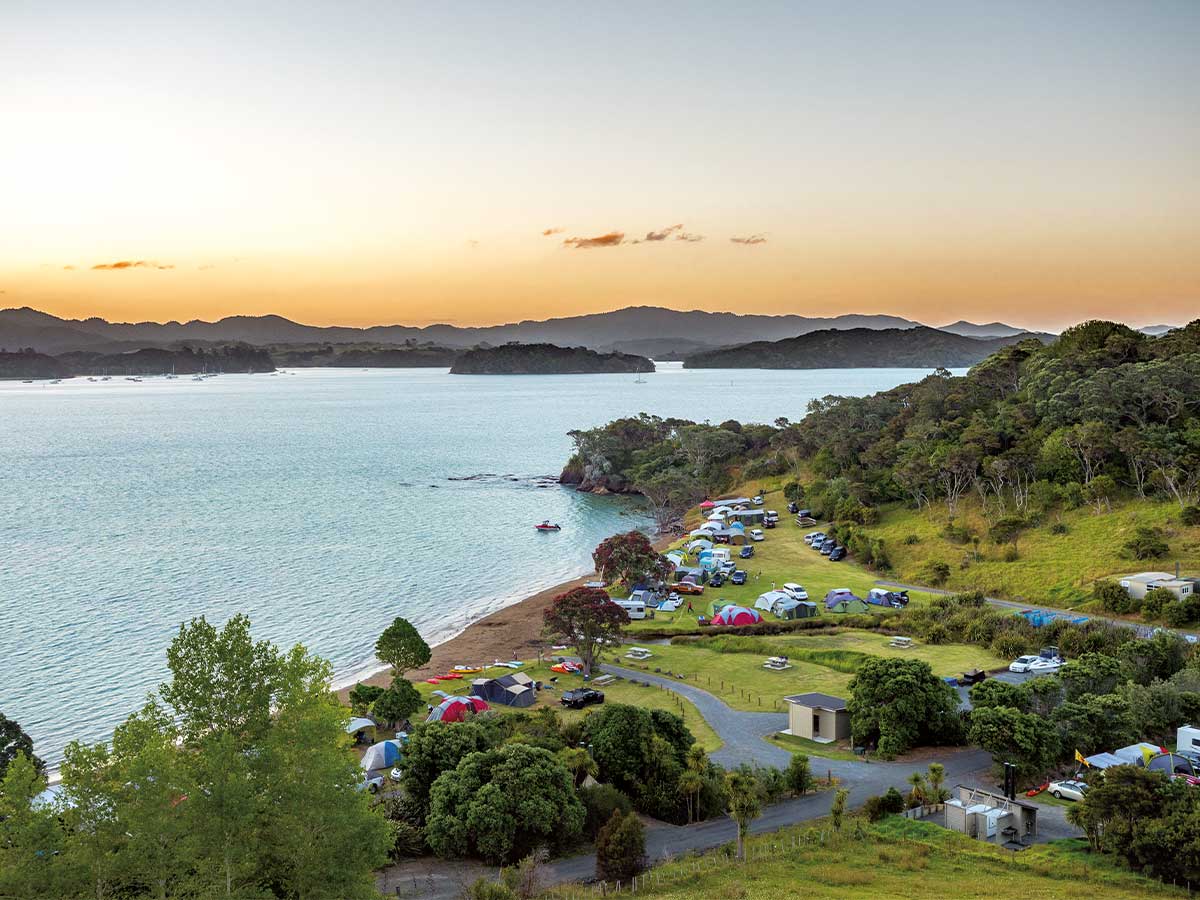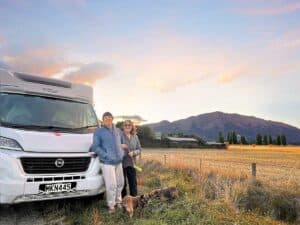Exploring New Zealand by motorhome, caravan, or camping brings with it a delicious sense of discovery and freedom. The lifestyle is uplifting, positive, and a wonderful way to meet new friends. However, those new to the experience may not be aware of the unwritten code of conduct that most adhere to. Seasoned traveller Jill Malcolm shares her advice.
So, there we were, parked in an idyllic spot away from the madding crowd in a delightful, low-cost, camping area next to a burbling river lined by low native forest. We were well back from the river’s bank because it looked a little unstable. This shady location and its view along the river was exceptional, and apart from a light, cooling wind ruffling the tips of the taller trees, the evening was blissfully calm.
It had been a long drive to get there. We pulled out the awning, unfolded the table and deck chairs, opened the wine, and settled down for a private happy hour, congratulating ourselves on picking the best spot.
And then it arrived – a coffee-coloured monster caravan towed by a bright red SUV, a rig that in other circumstances we might have admired. But it halted and squeezed side-on into the space between us and the view. There were only three other RVs in the entire camp and plenty of space elsewhere. I fluffed up my feathers and rose to my feet but before the full force of my indignation fell out of my mouth, I had a charitable thought – maybe they were just there temporarily and would move on when they’d admired the view?
But no, out came the chairs, the awning, and other paraphernalia. It became obvious they were setting up for more than happy hour. I sat in my ruined bit of paradise smouldering with resentment and mentally letting down their tyres and scratching their paintwork and hoping they would fall into the river.
When I’d calmed down (the wine helped), I got to thinking about the etiquette of motorhoming and caravanning – not the rules, but the niceties, the unwritten but generally understood Ps and Qs that run through the RV community. Not plonking your rig down in front of someone’s view when you don’t have to is one of them.
I would have thought that was a no-brainer.
Parking properly
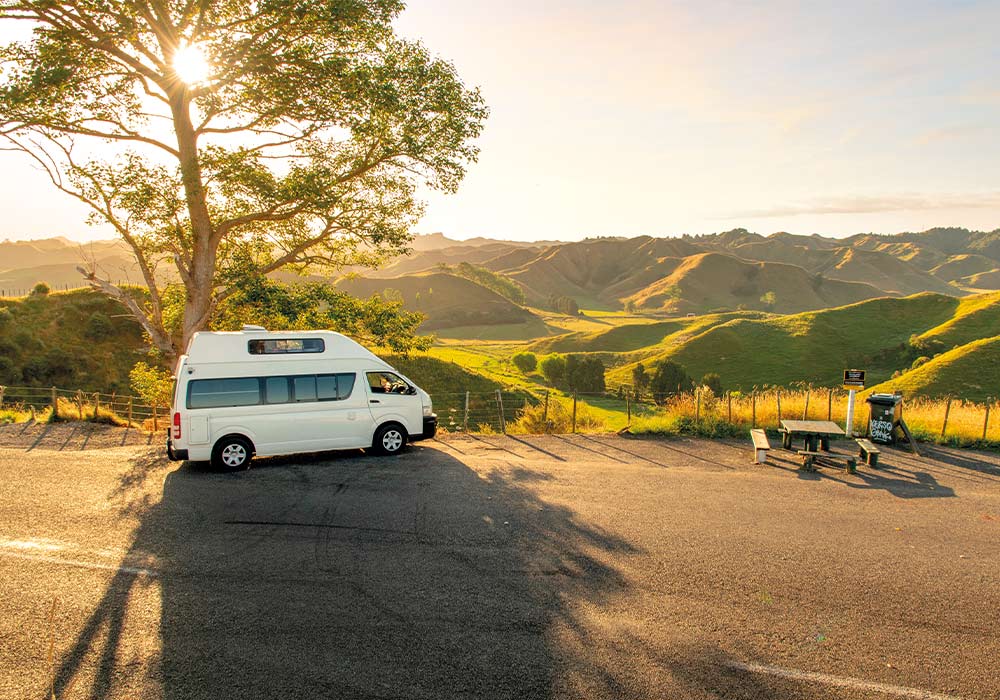
Where and how you park is important for several reasons. It’s intrusive, for instance, to have your home door and awning facing towards your neighbour’s home door and awning so that you’re staring into each others’ living spaces. Sometimes it’s unavoidable but never comfortable.
Nor is it comfortable to be too close to another motorhome or caravan, although, in a jam-packed area, that can be a bit difficult to manage.
NZMCA recommends that there should be a distance of three metres between RVs. This is also for safety reasons as you’ll have some chance of escaping your neighbour’s explosion or fire.
On the other hand, where there are no designated sites (as in DOC and freedom camps), it’s annoying when the camp is almost full to have some thoughtless clod park six to seven metres from their neighbour so no other RV can comfortably park in between them.
Ensure you park facing the exit. This is not to do with manners but to enable a quick getaway. We’ve certainly been grateful for this advice. In a small freedom camping area, three carloads of boy racers started their nefarious activity frighteningly close to where we were parked. We made a hasty escape and luckily, the only calamity was a container of rice that burst when it flew off the shelf. Rice was hurled from one end of the caravan to the other and we were still picking bits of it up five years later.
Road rules
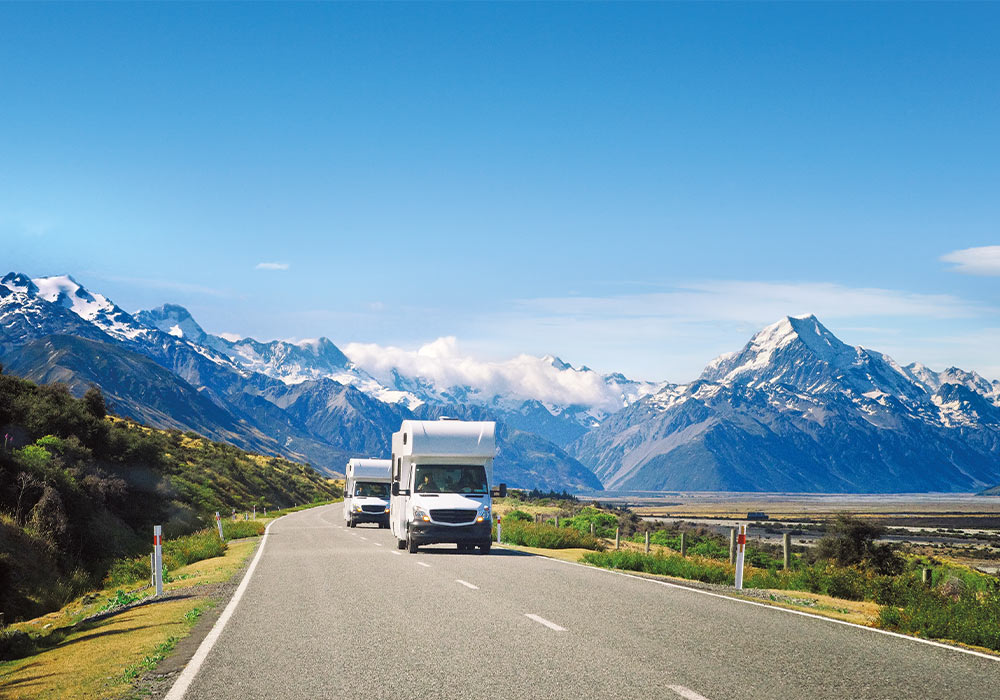
Another space issue is when motorhomes or caravans travel in convoys with no decent space between them, which makes them extremely hard to pass and infuriates other drivers. And, of course, slow-travelling vehicles (of any sort) should be considerate and pull over as soon as soon as they safely can and let faster traffic pass.
Courteous customs
Socialising is one of the wonderful aspects of camping, but to keep things congenial, it’s not done to walk through another’s designated patch unless invited.
If you go calling, think about the timing, so as not to interrupt people when they might be resting, cooking, or eating. When you’ve knocked and are invited inside, ask if the owners would like you to take your shoes off.
A great way of meeting people is by joining ‘happy hour’ meet-ups, bringing with you nibbles, your drink, and a chair. But judge when it’s appropriate. Sometimes, groups are exclusive.
Helping others in trouble is a Kiwi characteristic and this is emphasised in the RV community. Whenever we’ve wanted advice or needed help, it has been forthcoming. We return the favour when we can and, in some situations, I dip into the small cache of gifts I carry with me.
Dumping decorum
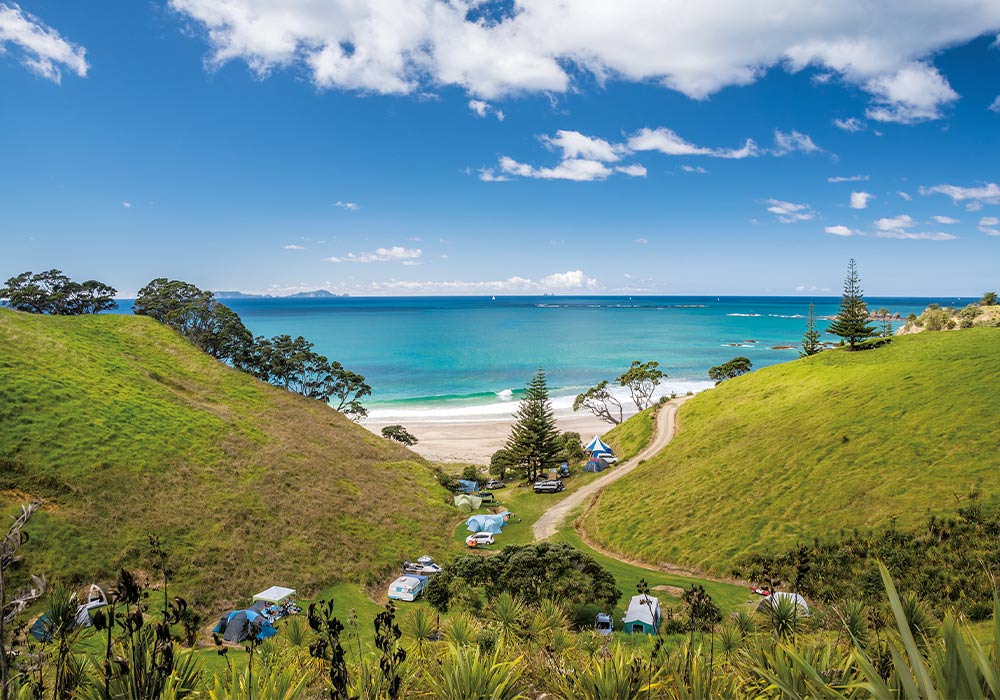
And here is the king of bad manners: parked at a council-provided air show a few years ago, I spotted a man emerge from his bus, open his grey water faucet, and stand there without displaying a hint of remorse, while foul-smelling water vomited onto the grass. Dumping grey water on the ground is not only uncivil but in some places also carries a fine.
If you’re in the wilderness and have no alternative, it might not be the end of the world to dump grey water on the ground but never near rivers, streams, lakes, or the sea. In all other places, it’s not tolerated.
NZMCA members are not permitted to empty grey waste onto the ground in any circumstances. Of course, black water should never be expelled anywhere other than a designated dump station. There are plenty of these around.
Regarding dump stations, tact is essential for making one of the more unpleasant tasks of motorhoming a little more palatable.
One thing that really gets up the nose (metaphorically speaking) of fellow RVers is people who leave a mess. It’s common decency to think about those who are going to follow you when you’ve done what you must do, be sure to hose away any evidence of your having been there. A fellow motorhomer once gave me another good point: “Cassette emptying is a one-person- job,” he said. “You don’t want a crowd hovering around watching, especially if things aren’t going as well as they might.”
Keep well back while you’re waiting your turn, and if people are queuing up, move off as quickly as you can.
As an aside, we’ve met and swapped stories with some interesting travellers while waiting for our turn at dump stations. A dunny is a strange place to make friends, but it’s one of the ways of the road.
Getting rid of rubbish is another issue, and it doesn’t take much common sense to dispose of it discreetly and tidily. If there are no bins on site, take it with you.
Pet protocols
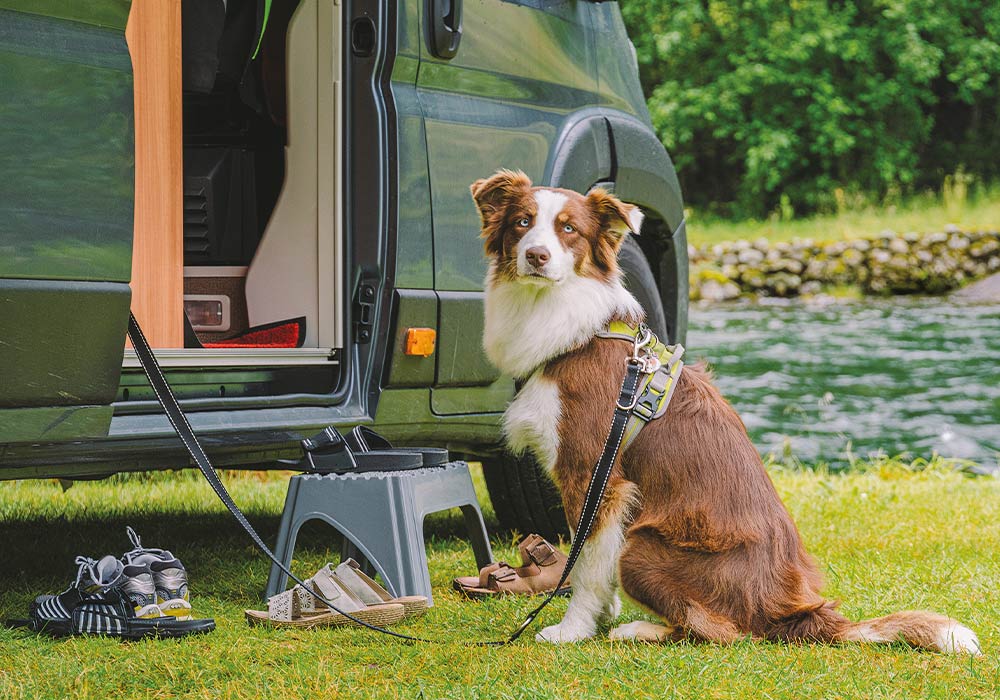
Most RVers like dogs, but no one wants man’s best mate lifting a leg on their matting or nicking a sausage off the barbie. I can say from experience that treading in their odorous deposits and then tramping the mess onto your own patch of paradise is not conducive to peaceful co-existence. Happily, this rarely occurs. Ninety-five percent of RVers make every effort to ensure their pooches, cats, and sometimes birds don’t cause concern.
Noise nuisance
Being parked in a group setting does mean being exposed to other people’s noises, but general politeness is usually always employed – but not always.
I have two pet peeves of my own. One is when I’m perched in some corner of a peaceful campground drinking in the silence when some mindless twat cranks up their music to 90 decibels forcing everybody else to listen to it. My second pet grumble is the merrymakers, who carry on their nightly revelry far too long, oblivious to the gnashing of teeth from their fellow campers. I’m no party pooper but by 10 pm, fold it up folks, other people need their sleep.
Generators are also noisy, but most users seem to choose their timing politely.
The saying “mind your Ps and Qs” means being considerate. The old adage comes from the days when typesetters had to set up letters on blocks, and if they didn’t pay attention, it was easy to put a lowercase ‘p’ where a ‘q’ should be (or vice versa). Thankfully, by far, the majority of the New Zealand caravanners and motorhomers have their Ps and Qs well sorted. And I apologise to any innocent RVers who happen to be driving a red SUV and towing a coffee-coloured caravan.
Travel and park with care and contribute in a positive manner to the environment and people around you, and you’ll find rich rewards and fine friendships.

